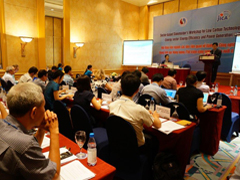- Home
- Technical Cooperation Projects
- Index of Countries
- Asia
- Viet Nam
- Project to Support the Planning and Implementation of NAMAs in a MRV Manner (SPI-NAMA)
- Project Activities
- Output 1 National Level Activities and Measures (from Year 2015 to present)
- Low-carbon Technology Assessment
- Summary of Energy-efficiency Sectoral dialogue on low-carbon technology
Project Activities
Summary of Energy-efficiency Sectoral dialogue on low-carbon technology
 During the framing lecture at the workshop
During the framing lecture at the workshop
Hanoi, 8th June 2017, under the framework of the "low carbon technology assessment", the Ministry of Natural Resources and Environment, Viet Nam and the Japan International Cooperation Agency (JICA) co-organized the "Sector-based stakeholders' workshop for low carbon technology assessment" for the energy efficiency and power generation sectors. The workshop has the participation of Vietnamese experts and specialists from ministries and organizations, corporations, and international experts.
For Energy-efficiency sector, key discussion points can be summarized as follows:
| Training for servicing personnel |
|
| Current situation of technology transfer |
|
| ESCO (Energy Saving COmpany) |
|
| Cross-sectoral technologies |
|
| Green building |
|
| Evaluation criteria |
|
| Awareness |
|
The next step will be:
- To discuss the feasibility of application of the proposed technologies in the context of Viet Nam, taking into consideration of barriers in policies and technical aspects.
- To elaborate on the technology and action assessment criteria for prioritization and its application in Viet Nam.
- To come up with some possible recommendations on policy, awareness and human capacity in order to maximize total efficiency of technologies to be introduced.
- To consider in future, generic technologies (such as "motor", and "pump") which can be applied across sub-sectors and industries.
The "Low Carbon Technology Assessment" was jointly launched by the Department of Climate Change (MONRE) and JICA under the "Project to Support the Planning and Implementation of NAMAs in a MRV Manner (SPI-NAMA)", with the main purpose of conducting technical assessment of mitigation measures for achieving the GHG emission reduction targets set out in the Nationally Determined Contributions (NDC) submitted by the Government of Viet Nam to the United Nations Framework Convention on Climate Change (UNFCCC).
- About JICA
- News & Features
- Countries & Regions
- Our Work
- Thematic Issues
- Types of Assistance
- Partnerships with Other Development Partners
- Climate Change / Environmental and Social Considerations
- Evaluations
- Compliance and Anti-corruption
- Science and Technology Cooperation on Global Issues
- Research
- JICA Development Studies Program / JICA Chair
- Support for the Acceptance of Foreign HRs / Multicultural and Inclusive Community
- Publications
- Investor Relations
